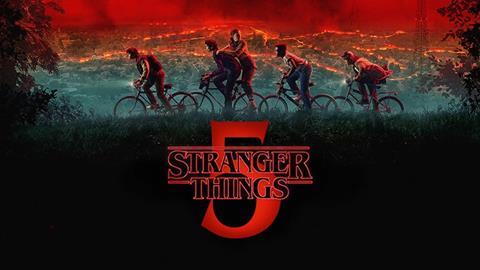Stranger Things series 5 starts on 26 November - it can be dark and violent but Sandeep Louise suggests that it can help parents have spiritual conversations with their young people

Disclaimer: Current age rating for Stranger Things is 15. This may change at release and parents are encouraged to check the BBFC before release on 26 November. IMDB also provide helpful information relating to the content of series so you can make your own mind up about suitability.
A parallel dimension with evil lurking, a saviour-like character who is chosen to save the world, and a raging war against good and evil …… sounds familiar to what we read throughout the Bible doesn’t it?
Well, these are three themes from the hit series Stranger Things which is launching the final season this month on 26 November on Netflix. The series premise coincides and mirrors themes from the Bible, thus providing conversation starters – especially if you’re a parent with a teenager.
The central theme throughout Stranger Things is the fight between good and evil
When Stranger Things was first released in 2016, it was heralded as the modern-day Goonies film. With an adventure in an unknown place and children as the protagonists, this sci-fi genre series hooked a young generation to watch and enjoy the retro props, vintage clothing and 80’s music immersing modern day people back into a specific time of living.
From season one, this series explored themes of good vs evil and created a parallel universe where evil resided with open gateways for this evil to manifest and impact the real world. We’re going to explore three ways Stranger Things reflects biblical themes in order to engage the younger generations into conversations.
1. Parallels to two worlds - Upside Down vs spiritual world
The show depicts a secondary world not accessible to the naked eye but is covered in darkness. There are characters within this world called Demogorgons, Shadow, and Vecna. All evil characters are intent on hunting, possessing and killing anything good in an attempt to avenge the wrongs done to them. The place is called the Upside Down.
In Ephesians 6 in the Bible, Paul writes about the spiritual armour of God and creates and expresses imagery depicting a separate world in which there are spiritual principalities and dark forces. He writes, “for our struggle is not against flesh and blood, but against the rulers, against the authorities, against the powers of this dark world and against the spiritual forces of evil in the heavenly realms.”
The Upside Down is a dramatized visual parallel to the world Paul makes mention of in Ephesians 6 and can help us draw on real conversations about this and how we can best guard ourselves and draw on the Holy Spirit to protect us. I love that Paul continues this verse by giving us the instructions of what we need to be spiritually equipped for the Upside Down reality we can sometimes experience.
2. Saviour complex: El vs Jesus
Although we don’t know how things will end in the final season yet until it’s released this month, the character El (known also as Jane) - played by Millie Bobby Brown - is the protagonist who has superpowers to defeat the evil Vecna and destroy the Upside Down and save the world. In most sci-fi films and series in pop culture, there is always a saviour character.
I believe the depiction of this across digital media in pop culture is a response to our own deeper longing to find someone worth following who can truly save the world. I believe every one of us, long to see the wrongs put right in the world and we place our hope in people this side of heaven to do that. Whether that’s a politic figure, a superhero figure or Jesus himself; we look to someone else to save us or the people we love and the world we live in.
This link is a great conversation starter of what a saviour like figure would look like in our world today
From the Bible, we know that the saviour of the world is Jesus. He’s often the centre point of imagery and depictions of a saviour. Stranger Things mirrors this with the character El, who hold superpowers and the ability to save her friends.
It is often the case with teenagers that they will look to pop culture and put hope in a fantasy character and commit to a fandom hype, before they put their trust fully in Jesus. We all can be susceptible to this, due to our fallible nature as humans.
This link is a great conversation starter of what a saviour like figure would look like in our world today. We know, the biggest difference with Jesus from all other religious figures, is that he walked this earth and knew what it was to be fully human and fully God.
3. Waging a war: good vs evil
The central theme throughout Stranger Things is the fight between good and evil. The evil is trying to take over a town or city or lives of the school kids. This is the running theme throughout the Bible from the beginning when we see the first murder take place between Cain and Abel in Genesis 4, the first rebellion of the Israelite people when they are rescued but they want to worship a golden calf instead, right through to Jesus overcoming death in the gospels and his second coming revealed in Revelation.
Read more:
Wicked: For Good is a film that’s ripe for helping Christian families see God’s hand in our relationships
What The Celebrity Traitors reveals about the human heart — and why Christian parents should care
Despite the dark exterior Wednesday has themes Christian parents should welcome and lean into with their families
These are all pointers to our internal longing to be found on the right side of humanity and a constant battle of good vs evil around us. These are conversation starters for young people to engage in the deep questions of their intrinsic longings to see a world put right. Sharing what we read in Revelation chapters 21 and 22 points to a world to come where there is no more death, no more pain, no more crying. A world put right again and a God who is close to people too.
Conclusion
Pop culture and TV series always provide parallels to help us process the world around us as well as escape the world around us. There’s not much escaping from what we read on the news and although it may be hard to dialogue on the big things going on in our reality, by engaging from a perspective following a TV series, conversations may be easier to be had from parents to teenagers.
If the topic of Stranger Things comes up in your household, this article will hopefully give you the skeleton of how to engage in a healthy dialogue which engages a faith perspective through the parallels presented.

































